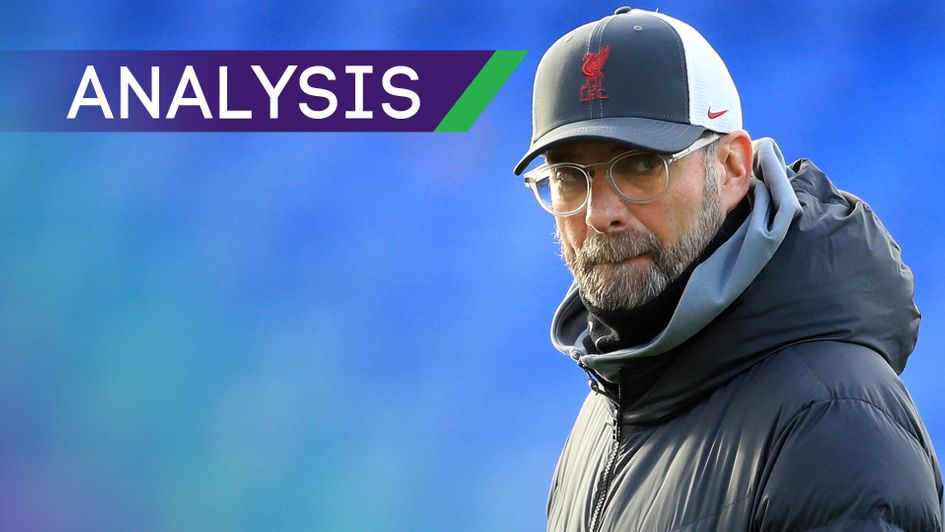
What has happened to Liverpool? Expected goals analysis of the Reds' drop in form
Liam Kelly uses the Infogol model to analyse Liverpool's recent decline, using expected goals (xG).
A version of this article was originally published on January 20, before Burnley's 1-0 win at Liverpool. The stats do not include that fixture.
Salah struggling for form
Inefficiency in front of goal has cost Liverpool valuable ground, scoring just once from chances equating to 6.3 expected goals (xG) in their last four Premier League games — dropping to fourth place in the table as a result.
Overall attacking output has declined recently, too, averaging 1.56 expected goals for (xGF) per 95 minutes across their last nine league fixtures after a scorching start to the season, when they averaged 2.53.
Of Liverpool's much-vaunted front three, Mohamed Salah's dip stands out.
At first glance, he appears to be at his brilliant best, topping the Premier League scoring charts with 13 goals. However, five of those have come from the penalty spot, and his underlying metrics are a cause for concern.
Salah is averaging 0.36 non-penalty xG per game this season, an evident drop-off from his previous Liverpool campaigns.
A fair portion of that steep decline can simply be attributed to the location of Salah’s efforts on goal - the Egyptian has not had a single shot inside the six-yard box in the Premier League this season.
Salah recorded eight shots in the six-yard box in 2017/18, 14 the following year and nine in the champions' title-winning campaign.
As a result, his non-penalty xG per shot has dropped from an average of 0.14 over his first three years at Liverpool to 0.11 this season.
Although Sadio Mane and Roberto Firmino’s creative numbers remain positive, they too are struggling in front of goal. Liverpool are currently missing the spark that their typically energetic front three often provide.
But above all, and despite the constant media debate over Firmino potentially giving way for the impressive Diogo Jota when the Portuguese returns to fitness, in pure numbers terms it is Salah who ought to be looking over his shoulder.
How much do they miss Van Dijk?
Jordan Pickford's horror challenge on Virgil van Dijk in October's Merseyside derby marked the beginning of a spate of injuries in Liverpool's defensive unit, with Alisson, Joe Gomez, Joel Matip, Fabinho and Trent Alexander-Arnold all missing for significant periods.
In the 13 league games since Van Dijk's injury, Andrew Robertson has been the only constant in 10 different back-four combinations. The changing centre-back pairings are responsible for most of that - Jurgen Klopp has selected seven alternative partnerships.
Academy products Nathaniel Phillips and Rhys Williams have been handed Premier League debuts, while more recently Fabinho and Jordan Henderson have been relied upon to perform out of position alongside one another.
Liverpool used only three centre-back combinations in the entirety of their wildly successful 2019/20 campaign; Van Dijk featured in all three.
But somewhat surprisingly, this ever-changing, makeshift backline has risen to the occasion, with the Reds conceding chances equating to an average of 1.09 expected goals against (xGA) per game in the Dutchman's absence.
Although those numbers are similar to their title-winning season (1.13) Van Dijk’s presence as an aerial force is undoubtedly missed in both boxes.
Headed chances conceded by Liverpool last season amounted to 0.15 xG, and 0.07 xG2 per game (xG2 accounts for shot power, placement and other variables for shots on target). Both have risen to 0.22 this term.
At the opposite end, only 13% of the Reds' total xG has come from set-piece situations, one of the lowest returns in the Premier League.
Anfield breached but away form the real concern
Liverpool were short-priced favourites to extend their 68-game unbeaten home league record against Burnley on Thursday, but defeat should not have been treated as the enormous shock it was given the slump the Reds are now in.
While Liverpool have maintained what remains a chasm between their xGF and xGA, there were signs of the trend lines converging, perhaps as sides have slowly worked out the best way to frustrate Jurgen Klopp's side at fortress Anfield.
After all, disrupting and frustrating the opposition could hardly be more Burnley - and so it proved.
Liverpool deserve huge praise, though, for that phenomenal, record-breaking run; the underlying metrics behind it were astounding. The Reds averaged 2.28 xGF and 0.83 xGA across near enough four years, stretching back to April 2017's defeat by Crystal Palace.
They lost the xG battle in just seven of those matches, all of which were against top class opposition - Man City (3), Chelsea (2), Spurs and Leicester - and often by a narrow margin.
Now, if they are to get their season back on track, Klopp's men must quickly address their far less impressive away form.
Headlined by a heavy 7-2 defeat at Aston Villa (xG: AVL 3.36 – 1.75 LIV), they have won just two of nine Premier League away games, posting a middling +4.0 expected goal difference (xGD) in the process.
And they could hardly be facing a sterner test next up, as a trip to bitter rivals Manchester United in the FA Cup fourth round awaits on Sunday.
This massive week in Liverpool’s faltering season just got bigger - they head to Old Trafford with it hanging by a thread.